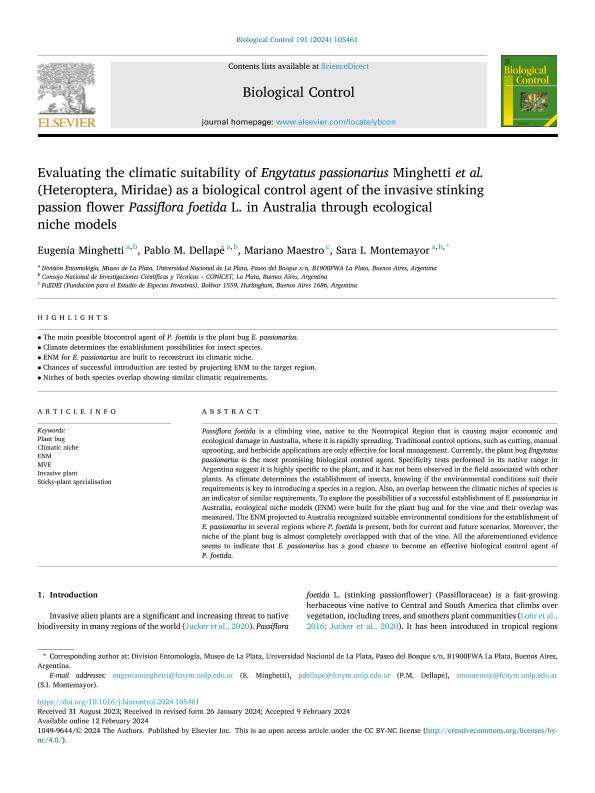Mostrar el registro sencillo del ítem
dc.contributor.author
Minghetti, Eugenia

dc.contributor.author
Dellapé, Pablo Matías

dc.contributor.author
Maestro, Mariano

dc.contributor.author
Montemayor Borsinger, Sara Itzel

dc.date.available
2024-03-20T15:05:33Z
dc.date.issued
2024-04
dc.identifier.citation
Minghetti, Eugenia; Dellapé, Pablo Matías; Maestro, Mariano; Montemayor Borsinger, Sara Itzel; Evaluating the climatic suitability of Engytatus passionarius Minghetti et al. (Heteroptera, Miridae) as a biological control agent of the invasive stinking passion flower Passiflora foetida L. in Australia through ecological niche models; Academic Press Inc Elsevier Science; Biological Control; 191; 4-2024; 1-7
dc.identifier.issn
1049-9644
dc.identifier.uri
http://hdl.handle.net/11336/231084
dc.description.abstract
Passiflora foetida is a climbing vine, native to the Neotropical Region that is causing major economic and ecological damage in Australia, where it is rapidly spreading. Traditional control options, such as cutting, manual uprooting, and herbicide applications are only effective for local management. Currently, the plant bug Engytatus passionarius is the most promising biological control agent. Specificity tests performed in its native range in Argentina suggest it is highly specific to the plant, and it has not been observed in the field associated with other plants. As climate determines the establishment of insects, knowing if the environmental conditions suit their requirements is key to introducing a species in a region. Also, an overlap between the climatic niches of species is an indicator of similar requirements. To explore the possibilities of a successful establishment of E. passionarius in Australia, ecological niche models (ENM) were built for the plant bug and for the vine and their overlap was measured. The ENM projected to Australia recognized suitable environmental conditions for the establishment of E. passionarius in several regions where P. foetida is present, both for current and future scenarios. Moreover, the niche of the plant bug is almost completely overlapped with that of the vine. All the aforementioned evidence seems to indicate that E. passionarius has a good chance to become an effective biological control agent of P. foetida.
dc.format
application/pdf
dc.language.iso
eng
dc.publisher
Academic Press Inc Elsevier Science

dc.rights
info:eu-repo/semantics/openAccess
dc.rights.uri
https://creativecommons.org/licenses/by-nc/2.5/ar/
dc.subject
Plant bug
dc.subject
Climatic niche
dc.subject
ENM
dc.subject
MVE
dc.subject
Invasive plant
dc.subject
Sticky-plant specialization
dc.subject
Plant bug
dc.subject
ENM
dc.subject
MVE
dc.subject.classification
Ecología

dc.subject.classification
Ciencias Biológicas

dc.subject.classification
CIENCIAS NATURALES Y EXACTAS

dc.title
Evaluating the climatic suitability of Engytatus passionarius Minghetti et al. (Heteroptera, Miridae) as a biological control agent of the invasive stinking passion flower Passiflora foetida L. in Australia through ecological niche models
dc.type
info:eu-repo/semantics/article
dc.type
info:ar-repo/semantics/artículo
dc.type
info:eu-repo/semantics/publishedVersion
dc.date.updated
2024-03-19T14:12:18Z
dc.journal.volume
191
dc.journal.pagination
1-7
dc.journal.pais
Estados Unidos

dc.description.fil
Fil: Minghetti, Eugenia. Universidad Nacional de La Plata. Facultad de Ciencias Naturales y Museo. División Entomología; Argentina. Consejo Nacional de Investigaciones Científicas y Técnicas. Centro Científico Tecnológico Conicet - La Plata; Argentina
dc.description.fil
Fil: Dellapé, Pablo Matías. Universidad Nacional de La Plata. Facultad de Ciencias Naturales y Museo. División Entomología; Argentina. Consejo Nacional de Investigaciones Científicas y Técnicas. Centro Científico Tecnológico Conicet - La Plata; Argentina
dc.description.fil
Fil: Maestro, Mariano. Fundación para el Estudio de Especies Invasivas; Argentina
dc.description.fil
Fil: Montemayor Borsinger, Sara Itzel. Universidad Nacional de La Plata. Facultad de Ciencias Naturales y Museo. División Entomología; Argentina. Consejo Nacional de Investigaciones Científicas y Técnicas. Centro Científico Tecnológico Conicet - La Plata; Argentina
dc.journal.title
Biological Control

dc.relation.alternativeid
info:eu-repo/semantics/altIdentifier/url/https://linkinghub.elsevier.com/retrieve/pii/S1049964424000239
dc.relation.alternativeid
info:eu-repo/semantics/altIdentifier/doi/http://dx.doi.org/10.1016/j.biocontrol.2024.105461
Archivos asociados
